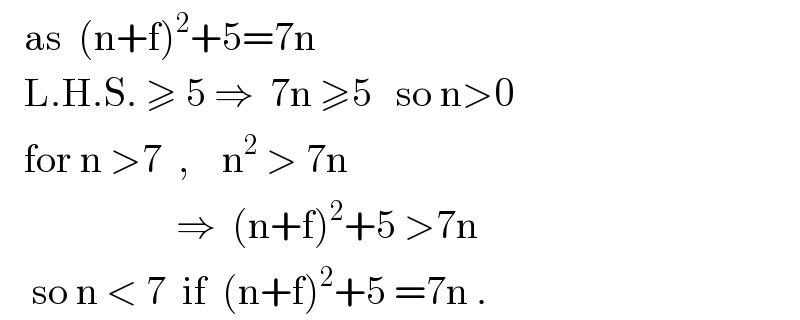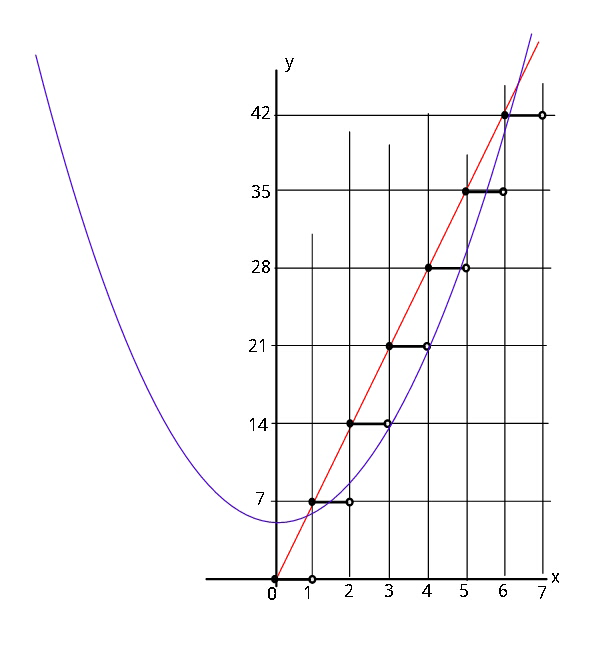Question Number 19409 by Tinkutara last updated on 10/Aug/17
![What is the sum of the squares of the roots of the equation x^2 − 7[x] + 5 = 0? (Here [x] denotes the greatest integer less than or equal to x. For example [3.4] = 3 and [−2.3] = −3.)](https://www.tinkutara.com/question/Q19409.png)
Commented by mrW1 last updated on 11/Aug/17

Answered by mrW1 last updated on 11/Aug/17
![f(x)=x^2 −7[x]+5 let x=f+d with 0≤d<1 ⇒f(x)=(f+d)^2 −7f+5=f^2 +(2d−7)f+(d^2 +5) f(x)≥f^2 −7f+5=g(x) f(x)<f^2 −5f+6=h(x) g(x)=f^2 −7f+5=(f−((7−(√(29)))/2))(f−((7+(√(29)))/2)) h(x)=f^2 −5f+6=(f−2)(f−3) since g(x)≤f(x)<h(x), solution of f(x)=0: ((7−(√(29)))/2)≈0.807≤f<2 or 3<f≤((7+(√(29)))/2)≈6.192 ⇒f=1,4,5,6 with x=1+d: (1+d)^2 −7×1+5=0 ⇒d=(√2)−1 ⇒x=1+(√2)−1=(√2) with x=4+d: (4+d)^2 −7×4+5=0 ⇒d=(√(23))−4 ⇒x=4+(√(23))−4=(√(23)) with x=5+d: (5+d)^2 −7×5+5=0 ⇒d=(√(30))−5 ⇒x=5+(√(30))−5=(√(30)) with x=6+d: (6+d)^2 −7×6+5=0 ⇒d=(√(37))−6 ⇒x=6+(√(37))−6=(√(37)) all solutions: (√2), (√(23)), (√(30)), (√(37)) sum of their squares: 2+23+30+37=92](https://www.tinkutara.com/question/Q19477.png)
Commented by mrW1 last updated on 11/Aug/17

Commented by Tinkutara last updated on 12/Aug/17

Answered by ajfour last updated on 12/Aug/17
![let x=n+f let x=[x]+{x}=n+f then (n+f)^2 +5−7n=0 ⇒ (n+f)^2 +5 is an integer =7n clearly 0<n<7 and 0≤f<1 x=n+f =(√(7n−5)) , f=x−n for n=1 , x=(√2) , f=(√2)−1 n=2 , x=3 , f=1 so not acceptable; n=3 , x=4 , f=1 not acceptable; n=4 , x=(√(23)) , f=(√(23))−4 this is quite alright ! n=5 , x=(√(30)) , f=(√(30))−5 and if n=6 , x=(√(37)) , f=(√(37))−6 acceptable then are n=1, 4, 5, 6 Σx^2 =Σ(7n−5) = 2+23+30+37 = 92 .](https://www.tinkutara.com/question/Q19491.png)
Commented by ajfour last updated on 12/Aug/17

Commented by Tinkutara last updated on 12/Aug/17

Commented by ajfour last updated on 12/Aug/17

Commented by ajfour last updated on 12/Aug/17
![y=7x ; y=x^2 +5 ; y=7[x]](https://www.tinkutara.com/question/Q19498.png)
